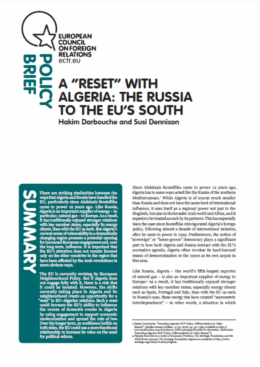A ‘reset’ with Algeria: the Russia to the EU’s south
Algeria is at risk of turmoil without EU-backed reform
While Tunisia, Egypt and Libya have been convulsed by uprisings and conflict, Algeria has remained calm. But if upheaval does spread to Algeria this will further destabilise the region and harm Europe’s interests on issues of energy, security and migration.
In a new paper published by ECFR, A “reset” with Algeria: the Russia to the EU’s south’, Hakim Darbouche and Susi Dennison argue that Europe must shift the balance of power with Algeria, one of its key energy suppliers, in order to encourage much needed political reform and safeguard its own interests. The EU has a window of opportunity: Algeria has already felt the pressure for change, and indicated this week that it is willing to come to the negotiating table on a action plan for reform.
The authors argue that unrest has so far not ignited in Algeria because of its population’s memories of conflict and the money available for the authoritarian government to buy-off discontent. However,without reform, Algeria remains open to the risk of a violent upheaval, and this matters to Europe:
- Algeria is the EU’s third biggest supplier of gas (after Russia and Norway). It’s the main supplier of gas to Italy and Spain, and Liquid Natural Gas to France and Greece. Algeria’s reliability as a supplier of energy to Europe is based upon its stability.
- Algeria is a major security player in the Maghreb, Mediterranean and the Sahel. It is an important partner for the West in tackling Al-Qaeda in the Islamic Maghreb, Islamic terrorism and wider instability in North Africa.
- Algeria is both a source and transit country for migrants headed to Europe, and its cooperation is vital for the EU. Violent upheaval in Algeria would result in a loss of the government’s capacity to help manage migration.
Changes in North Africa are an opportunity for Europe to ‘reset’ its relations with Algeria, a partner that is too important to ignore. Europe must engage to support economic modernisation, developing trade links and spreading the rule of law, strengthening a vital part of our common neighbourhood.
– Susi Dennison
“In today's Middle East no regime is completely immune to pressure. Algeria has a greater buffer, both financially and politically, but only reform can in the medium-term safeguard the state. The EU needs to strike now, offering a new kind or reform-oriented relationship.” – Daniel Korski, ECFR Middle East director
Key facts:
- Algerians have a deep preference for stability after the decade of armed conflict between the military-backed government and various Islamist groups in the 1990s.
- President Bouteflika is not widely unpopular, and in February 2011 he lifted the state of emergency that had been in place for 19 years, promising reforms.
- 75% of Algeria’s unemployed are under the age of 30 (youth unemployment is 24%).
- Hydrocarbons represent 40-45% of total GDP, almost 100% of exports, and around 2/3 of budget revenues.
- 85% of Algeria’s expatriate community lives in France, with another 8% elsewhere in the EU mainly in Italy and Spain.
The European Council on Foreign Relations does not take collective positions. ECFR publications only represent the views of their individual authors.



